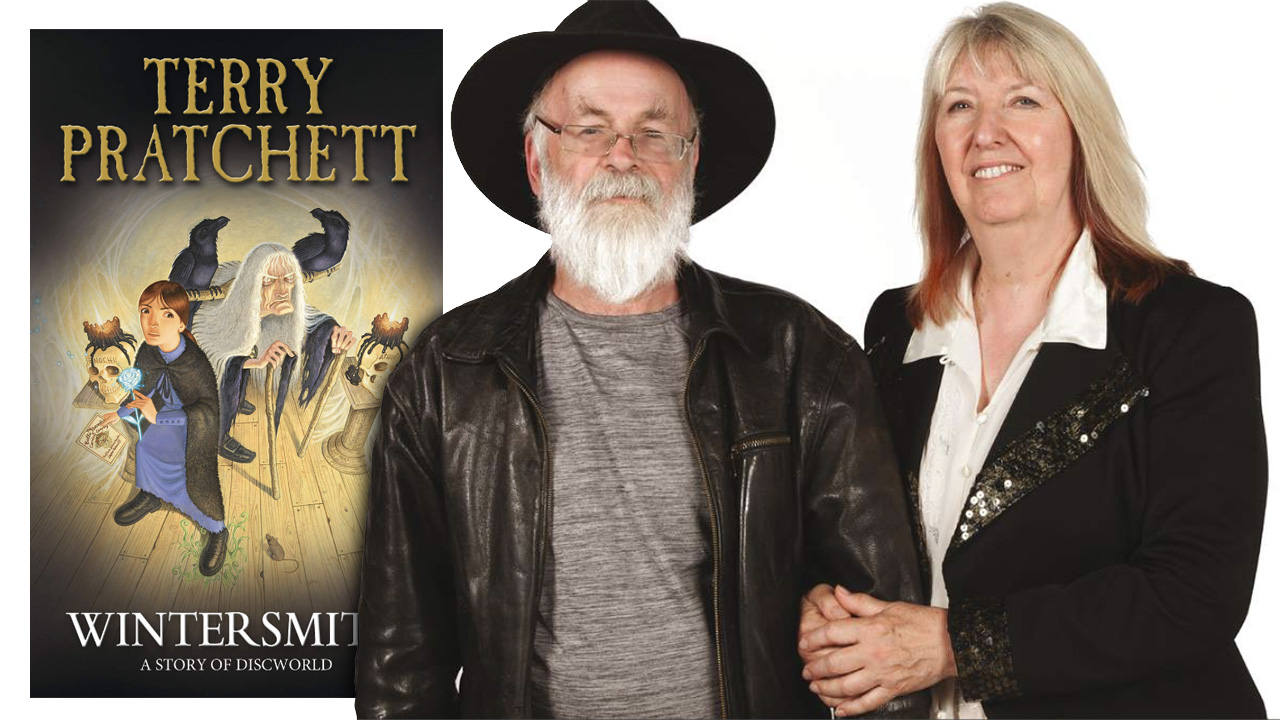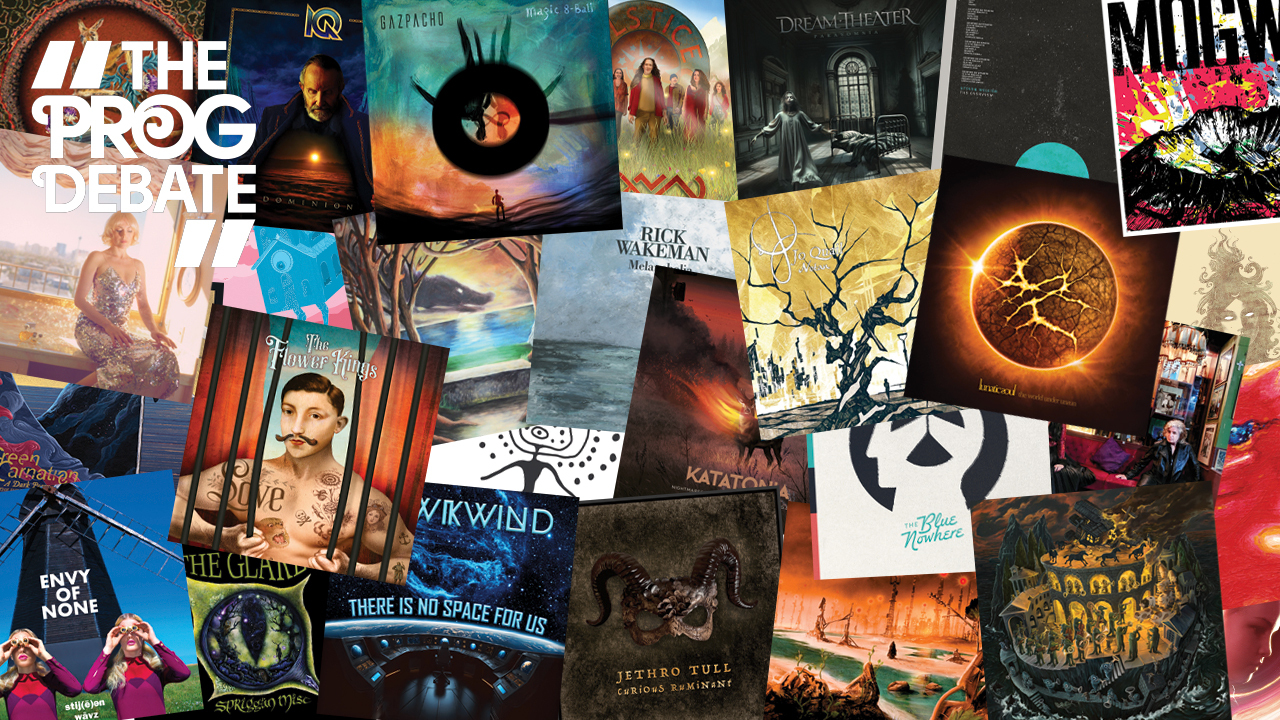“The book is quite dark, but never complete evil. It’s misunderstandings, and that’s what evil and sin are supposed to be”: How a Terry Pratchett Discworld novel became a Steeleye Span album
The late comic fantasy genius persuaded his favourite band to adapt 2006’s Wintersmith for folk rock, and both parties were delighted with the result

Steeleye Span’s dynamic 2013 album set Sir Terry Pratchett’s Wintersmith novel to music. That year, vocalist Maddy Prior and the author himself – who died in 2015 – told Prog how the folk-rock giants and the master of comic fantasy came together, and why “a good witch never cackles.”
It was a marriage made in heaven, or possibly Wiltshire. Steeleye Span, progenitors of British folk-rock, have pulled off the perfect way to fuel-inject their noble, 43-year recording life: an official trip to Sir Terry Pratchett’s Discworld.
The 70-million-selling comic fantasy author had been a Steeleye fan since their earliest days, and frequently went to see them play when they came by his hometown of Salisbury. As a guest on BBC Radio 4’s Desert Island Discs in 1997, he’d confirmed his status as a true Spanner by choosing Thomas The Rhymer, from their 1974 album Now We Are Six, as one of his eight recordings.
“The first album I ever bought was a Steeleye Span one,” he told presenter Sue Lawley, “and I’ve collected everything of theirs ever since. I was particularly thrilled when I heard their version of Thomas The Rhymer, where Thomas the bard is taken away by the queen of the elves.”
The band, in turn, loved Pratchett’s books. The first meeting of these masters in their respective fields took place in 2008, when Steeleye Span played Pratchett’s 60th birthday party. Then came his proposal that has produced what is, in every sense, a novel album. It’s based on Wintersmith, the 35th novel in the Discworld series, published in 2006.
“It was a project that he wanted to happen, because he’s a fan of ours,” says Steeleye’s vocalist and figurehead, Maddy Prior. “I’ve read loads of his books, I like what he does. He takes great big themes and puts them in fantasy and nonsense, and makes you think about them in a different way.
“I can’t remember quite at what point, but he suggested the idea of an album based on Wintersmith. It took quite a while for us to focus on doing it. Then gradually we said, ‘We’ll just go and write some songs and see what happens.’
Sign up below to get the latest from Prog, plus exclusive special offers, direct to your inbox!
“The whole thing has been quite extraordinary. I’m very proud of it as a record. I think we’ve done really well with it. How it worked, God alone knows. We got [former guitarist] Bob Johnson to come back as a guest, and he’s written a couple of pieces as well, and we all chose completely different things. There’s a couple of overlapping ideas, but it’s amazing how we came at it from completely different junctions.”
Terry’s used references from us – I can recognise them in his books – and from traditional music generally
Diagnosed with Alzheimer’s disease at the end of 2007, Pratchett continues to deal with his plight with impossibly good-humoured stoicism. He is, at 65, simply delighted with this new turn in his own story. “I knew if I got it in front of them, they would do it,” he says.
“What I’m so happy about is that I’m getting the imagery now, if you see what I mean. Tiffany Aching [the lead in Wintersmith] was one of the best characters I’ve made, I think. There’s more than one book about her, as she grows older. She starts off as an adolescent and ends up a fully-formed female, and she has to deal with the Wintersmith, who wants to snog her.”
In the album’s engaging sleevenote, Pratchett recounts how his mate Dave (“everybody’s got a mate called Dave; I’ve got about 15 but still, never mind”) sat him down as a teenager and played him Steeleye’s Boys Of Bedlam on two giant speakers. He was hooked forever by their deft appropriation of English folklore for a folk-rock audience.
Later, he and his heavily pregnant wife, Lyn, were at a Span gig at Bristol’s Colston Hall, where they bounced along to the point where he thought their daughter, Rhianna, was going to arrive there and then. Poetically, Rhianna became not just a writer but also a devotee of the band herself.
“Terry’s been a fan for a long time,” says Prior. “He’s used references from us – I can recognise them in his books – and from traditional music generally. He has all that at his fingertips. He’s very interested in it, as I am. I love all that, and the stories that go with it, and the ballads. It’s great music to work with.”
Even in the early days of the Wintersmith tour that ran through November and December, Prior could detect a change in the make-up of their audience. They willingly embraced the eight new pieces from the album, all of which were woven seamlessly by the band into a set of perennial, career-long folk-rock favourites. “We do get some younger people, because there is a new interest in folk music,” she says.
“It’s probably largely people who’ve followed us right through, so they’re quite discerning about what we do. But a friend was saying they’d had a couple of friends buy the album – they’d never have bought it except that they were big Terry Pratchett fans. They enjoyed it, so that’s good.”
Steeleye Span’s 22nd studio album takes long strides down a corridor that the group could – and perhaps should – have gone down long ago. “We had Chris Tsangarides do the mixing, and he’s brought something different to it, which we haven’t had for a quite a long time,” says Prior. “It’s got a different feel about it, more what I think Steeleye should have been. It’s been great to have Chris bring in that sonic quality that puts it in a slightly different place.”
Wintersmith is the third Discworld novel to feature Tiffany Aching. First seen in 2003’s The Wee Free Men, she is, by now, 13 years old and a trainee witch under the tutelage of Miss Treason. Tiffany is pursued by the Wintersmith – in reality, winter itself – who attempts to humanise himself to win her.
To describe what happens would be a spoiler for both book and album, but Prior agrees that the way in which the band’s musical traditions fit those of Pratchett’s writing is remarkable. “The book is quite dark, but he never has complete evil,” she says. “It’s always misunderstandings, missing the point, and that’s what evil and sin are supposed to be – missing the mark. He’s very good at doing that. There are scoundrels, but it’s got a flow that’s not depressing. He’s a brilliant writer; he’s covered huge amounts of ground.”
There’s a lot of really slow, beautiful pieces as well, but when we go for it, it really goes for it, and I think that’s what we’ve been missing
The author’s imagery has inspired Steeleye Span to make what deserves to be recognised as one of the best albums of their career. “I think it’s much more dynamic,” Prior says. “There’s a lot of really slow, beautiful pieces as well, but it’s the mixture. When we go for it, it really goes for it, and I think that’s what we’ve been missing.”
“There’s one piece that I really like, The Making Of A Man,” says Pratchett. “I always toss that one to the front because it’s sombre, and you feel for the winter because he’s such a dickhead. He doesn’t realise all of the things that go to make a man. You can’t make a man, as it were, by chopping up pieces of him.”
Formed in 1969, Steeleye Span were conceived as a more traditional outlet for bassist/vocalist Ashley Hutchings after he left Fairport Convention. With London folk club regular Prior and Tim Hart, plus husband and wife Terry and Gay Woods, they debuted the following year with Hark! The Village Wait, comprised almost entirely of trad pieces.
Another album of modern adaptations, Please To See The King, was Melody Maker’s folk album of 1971. The first of many line-up changes had already taken place before the band began their longtime affiliation with Chrysalis Records, moving ever further into electric folk, with many a historical twist.
Seven consecutive albums made the UK chart, two of them going gold, as Span achieved the improbable feat of a 1973 hit single with a 16th-century Latin carol, Gaudete. All Around My Hat, a folky top five sing-song, ensued two years later, which helped to send the parent album of the same name into the Top 10. “Chrysalis were very good to us, really,” says Prior. “We were mainly there, I think, because co-founder Chris Wright said we were the only band he could take his family to.”
In his recent autobiography, One Way Or Another, Wright recalls the band were first in the care of New Yorker Jo Lustig and then The Move’s “larger-than- life” Tony Secunda, whose managerial stunts took place at a Span gig at the Hammersmith Odeon – he “sprinkled around one thousand £5 notes over the audience from the roof of the venue.”
The longtime members have been in and out of the band enough to challenge a fiddler’s elbow, and Prior notes the latest departure of long-time violinist, pianist and vocalist Peter Knight after the Wintersmith tour. “All of us have been in and out a couple of times,” she says. “So it’s like it’s got its own trajectory.
“You do a body of work and you hope it’s good overall. A large part of it for me has been Steeleye Span, and Steeleye has a particular place in the music of England. The word ‘prog’ seems to have incorporated the sort of music that is on the edge of the mainstream – interesting music that is not formulaic. We like to think that’s what we’re doing, anyway.”
I was fascinated by his philosophy of witches, which is brilliant. And I saw this piece about the cackling, which I thought was lovely
But the band of the 2013-14 season is a different beast to the one that played during the 1970s. “There came a point where folk music went out of fashion, big time,”says Prior. “It’s a loop that goes round, and every so often it comes towards the centre. It never gets there. Then, every so often, it flings off into outer space. The thing is, it never goes away and it comes back again. It’s coming back at the moment.
“I feel that most of what we’ve done has been moved by the music,” she reflects. “We get a song and we go with that, and that leads us somewhere. Of course we’ve always been slightly experimental, so not all of it works. I think that’s one of the things about being experimental – they can’t all be winners.”
By immediate consent, Wintersmith is a winner. The band even had Pratchett himself appear a narrator. “I wrote The Good Witch,” says Prior. “I was fascinated by his philosophy of witches, which is brilliant. And I saw this piece about the cackling, which I thought was lovely.”
“A good witch never cackles,” says Terry on the track. “Cackling is not just nasty laughter – it means your mind drifting away from its anchor.”
“It’s just so clever the way it jumps at the end,” says Prior. “He talks about ‘a bad road, and at the end of that road, spinning wheels and gingerbread cottages.’ That’s such a brilliant turn on the whole idea of witches – and that’s what he does. He inverts a lot of the time.
“That fascinated me, and I thought, ‘I don’t want to read it, I’ll ask and see if Terry will,’ and he said yes, he’d be delighted to be on it. He loves the involvement with it; he’s really proud of the whole thing.”
Could another of Pratchett’s novels be, as it were, Steeleyed? “You’ve put me in a quandary there,” says the esteemed author, as if thinking about the prospect for the first time.
“I’m certain that if there’s any book of mine that could lend itself to being, shall we say, a song line, then they could do it. But I’m not actually going to sit there with a shotgun saying they must.”
Prog Magazine contributor Paul Sexton is a London-based journalist, broadcaster and author who started writing for the national UK music press while still at school in 1977. He has written for all of the British quality press, most regularly for The Times and Sunday Times, as well as for Radio Times, Billboard, Music Week and many others. Sexton has made countless documentaries and shows for BBC Radio 2 and inflight programming for such airlines as Virgin Atlantic and Cathay Pacific. He contributes to Universal's uDiscoverMusic site and has compiled numerous sleeve notes for the Rolling Stones, Eric Clapton and other major artists. He is the author of Prince: A Portrait of the Artist in Memories & Memorabilia and, in rare moments away from music, supports his local Sutton United FC and, inexplicably, Crewe Alexandra FC.

